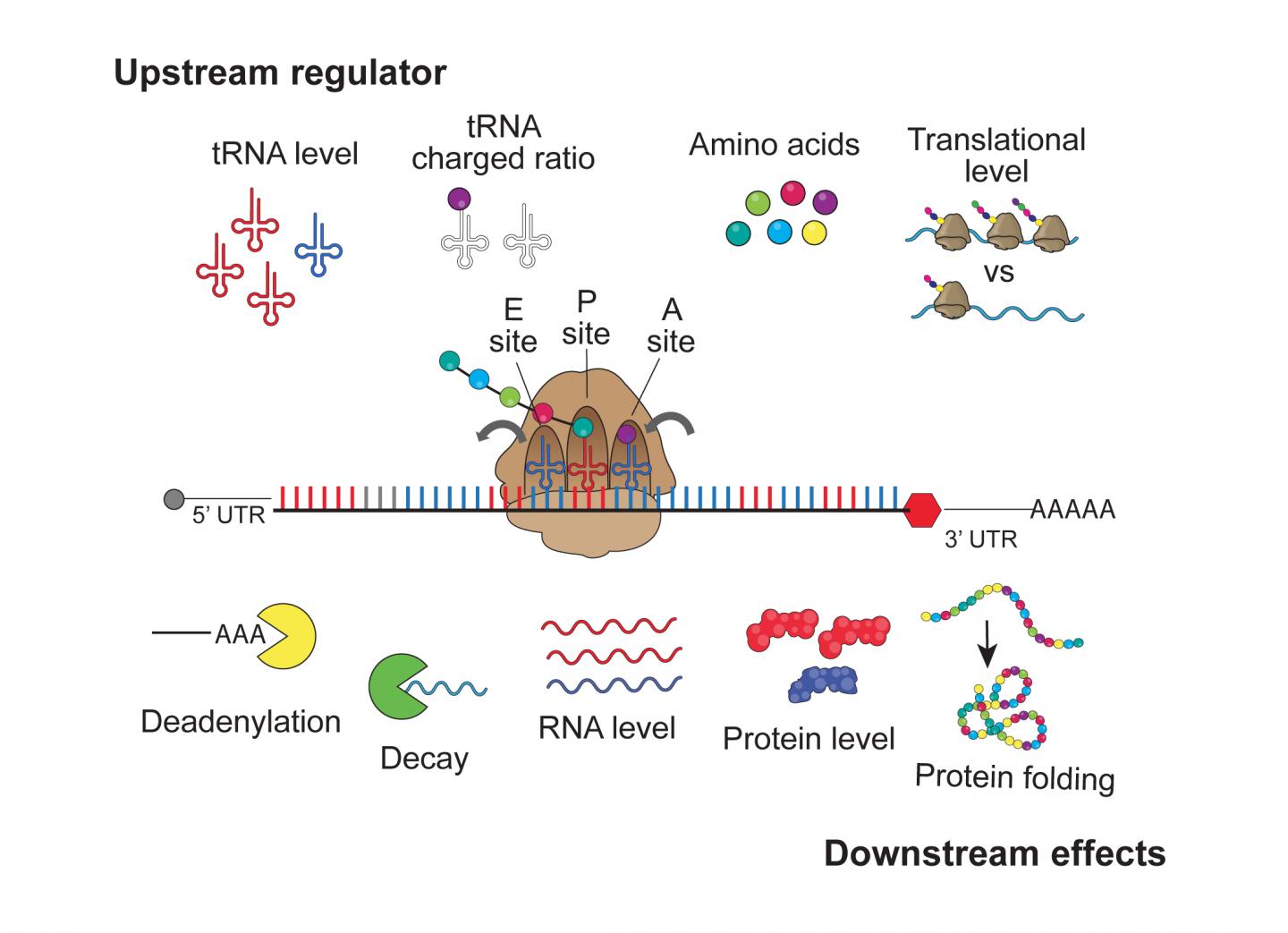A role for ribosomes in regulating human gene expression

Credit: Bazzini Lab
KANSAS CITY, MO– Researchers from the Stowers Institute for Medical Research have discovered a new function of ribosomes in human cells that may show the protein-making particle’s role in destroying healthy mRNAs, the messages that decode DNA into protein.
“For a long time, many people have viewed ribosomes as a passive player in the cell – a molecular machine that’s just producing proteins,” says Stowers Assistant Investigator Ariel Bazzini, PhD. “Now there’s growing evidence that ribosomes regulate gene expression, including in human cells.”
These findings, which were recently published online in eLife, could lead to further understanding mRNA’s role and the causes of gene misregulation in human diseases.
In the process of translation, ribosomes make proteins by serving as the site for the biological synthesis of them. Specifically, a ribosome reads codons – sets of three consecutive nucleotides – in an mRNA message to determine which amino acids to add to the growing protein chain. As part of this process, ribosomes also act as quality control, triggering the destruction of improperly made mRNA.
A growing body of evidence has shown ribosomes also play a role in affecting the stability (life) of properly processed mRNAs, thereby acting as a key factor in modulating mRNA stability, level of mRNA, and protein production. This had been shown in organisms such as yeast, E. coli, and zebrafish. In this study, researchers showed that ribosomes affect mRNA stability in human cell lines as well.
“We’re seeing that the amount of gene expression is a combination of mRNA production (transcription) and stability,” Bazzini says. “Think of a glass of water. To get an idea of how much water the glass holds at any particular time, it’s important to know how much water you initially pour into the glass but also important to know how much water you drink. The same is true with mRNAs. You can measure how many mRNAs are properly made, but if you don’t know how many of them are being broken down, how do you really know how many there are?”
These findings open the door to two exciting research avenues, says Bazzini. The first is better understanding how ribosomes trigger mRNA destruction, the molecular mechanism of which is still unknown. Ribosomes may not be the passive player researchers have long thought them to be.
“Similar to ribosomes, molecules called tRNAs, or transfer RNAs, are also fundamentally involved in protein synthesis,” says first author on the report and Stowers Predoctoral Researcher Qiushuang Wu. “We think that tRNAs, which recognize codons in mRNA and provide corresponding amino acids to ribosomes, might have a strong regulatory role in development and in human diseases.”
The second research avenue is looking at how this newly discovered regulatory molecular mechanism may be related to genes associated with human diseases. Sequencing of human genomes has shown that individuals sometimes have a “silent mutation,” which is a change in DNA sequence and codon that does not change the amino acid makeup of the resulting protein, as many amino acids are coded by multiple codons. However, the silent mutation might still have an effect if it leads to ribosomes destroying healthy mRNA.
“One of the most basic concepts of biology is how genes are regulated and how those regulations drive cells to become specialized. We’re interested in studying how post-transcription mechanisms work and, in particular, how ribosomes trigger mRNA destruction – how they trigger or recruit factors to carry out this process,” Bazzini says. “Understanding how translation affects mRNA expression at a molecular level allows us to start thinking about how mRNA translation might shape gene expression in cancer, aging, or viral infection.”
###
Other contributors from the Stowers Institute include Santiago Gerardo Medina, Gopal Kushawah, PhD, Michelle Lynn DeVore, Luciana A. Castellano, Jacqelyn M. Hand, PhD, and Matthew Wright.
The work was funded by the Stowers Institute for Medical Research.
Lay Summary of Findings
Ribosomes are well known for being the site of protein production in cells, where they decode DNA into protein in a process called translation. Recent research from Assistant Investigator Ariel Bazzini, PhD, and his laboratory at the Stowers Institute for Medical Research reveals that ribosomes have another important role involving the regulation of gene expression in human cells. The study was recently published online in the journal eLife.
In the study, the researchers showed that in human cell lines, ribosomes play an active role in regulating mRNAs – the messages that ribosomes read to make proteins. In addition to mRNAs encoding protein-making instructions, the study provides evidence for another layer of information within the messages that can affect mRNA levels and stability as well as protein production in a translation-dependent manner. Understanding the regulatory function of ribosomes in modulating gene expression in human cells can provide insight about causes of gene misregulation, which can sometimes lead to the human diseases.
About the Stowers Institute for Medical Research
The Stowers Institute for Medical Research is a non-profit, basic biomedical research organization dedicated to improving human health by studying the fundamental processes of life. Jim Stowers, founder of American Century Investments, and his wife, Virginia, opened the Institute in 2000. Currently, the Institute is home to about 500 researchers and support personnel, over 20 independent research programs, and more than a dozen technology development and core facilities. Learn more about the Institute at http://www.
Media Contact
Kimberly Bland, PhD
[email protected]




